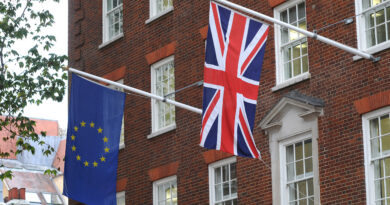Bittersweet citizenship: how European families in the UK cope with Brexit
About 80,000 EU nationals have applied for British citizenship since the UK voted to leave the European Union. The decision has rarely been easy. On the contrary, it has often been perceived as “forced” or as an attempt to “take back control” of life amid the Brexit uncertainty, a new research has revealed.
The contrasting feelings were highlighted in a study by “EU families and Eurochildren in Brexiting Britain”, a project by the University of Birmingham in cooperation with civil rights group the3million, Migrant Voice, and immigration barrister Colin Yeo.
Researchers interviewed 103 families in the UK in which at least one of the partners is a non-British EU national. They wanted to understand how Brexit is impacting the decisions they make about their legal status.
The study shows that while many are applying for naturalization, many more are still uncertain and “considering their options.” Better off and educated EU nationals from Western European countries are the most resistant to the idea of becoming British citizens as a solution to Brexit. This is especially true for Germans, “who feel like they somehow betray the European ideal in doing so,” says the report.
Others, particularly from Eastern Europe, take a more pragmatic approach. Those who apply often do it to protect their children. But instead of being seen as “the culmination of a path to integration”, naturalisation often generates “feelings of un-belonging and of disintegration”.
Lead author Nando Sigona, deputy director of the Institute of Research into Superdiversity at the University of Birmingham, discusses the research findings with Europe Street News.
Why a research on families rather than individuals?
We focused on families in which at least one of the partners is a non-British EU national because Brexit has legal implications for their rights and social implications for their choices. We wanted to explore the dilemmas these families face. For example, in a mix family ‘going back home’ is a complex issue: if you are a Polish-German couple who has met in the UK and speak English as main language, where is home? Probably in the UK.
We also thought about their children, the next generation. Even pro-migration groups have been very utilitarian in their approach to European migrants. They say they are needed because they work hard, they are young and they contribute to the economy. I personally hate this narrative because I do not like to have a price tag on my head. And for children the situation is even more complicated: they are not productive, they use schools and services, and yet they are in the UK as legitimate residents. According to Migration Observatory, there are more than 900,000 children of EU parents (Ireland excluded) in the UK. How will British society look like in 20 or 30 years, when these children will be adult? What will be the impact of the way they have been treated? These are the questions we wanted to examine.
Is this why the project refers to ‘Eurochildren’?
Yes, but let’s not forget that in these families there are British nationals too. We could have called the project “British families with European heritage” and probably we would have got more attention from politicians who have a responsibility towards their citizens, those they do not treat as “others”.
We usually refer to the 3.8 million EU nationals in the UK, according to the latest Eurostat data. But, as you say, many of them have British partners and children. How many people are really impacted by Brexit?
It is almost impossible to know because of the way official data are collected. In case of dual nationality, the Office for National Statistics prioritises the British one so people disappear from the statistics on EU nationals. Our research also looked at the census data of the past 40 years, with children of earlier migrants now registered as British. The legacy of EU’s free movement in the UK is much larger that what people think.
This means that no one knows how many people might or might not be protected by the withdrawal agreement – if there is one – or by the “settled status” scheme.
The situation is so complicated. Within the same family different members may have different rights. The problem with European families is also that, when they moved to the UK, this was not part of the deal. Their legal status was not something they had to worry about. The government is now ignoring or underestimating this situation by imposing a retroactive bureaucratic monstrosity like the “settled status”. The risk is that many will be left out. The only solution would be to turn the process into a registration rather than an application, and to leave it open. Some people will be inevitably left out, but at least they won’t become unlawful.
Based on your interviews, what has changed for these families since the Brexit vote?
Most people feel unsettled because they failed to see Brexit coming. They did not think a majority would vote against the EU and they were not prepared for it. Secondly, they feel forced to consider their options and to make important decisions such as applying for British citizenship or leaving. The configuration of the family, for example whether or not the partners are from the same EU country, can make a difference for their opportunities. There is also a sense of being forced to define themselves. Previously mix families could reconcile their identities under a European umbrella, but Brexit is changing that. However, it is important to acknowledge that people have different feelings about the situation and to not monopolise their voices.
Are the responses you received uniform across the UK?
There are places where people feel more secure. London feels safer, respondents said, as a majority voted to stay in the EU, the environment does not feel hostile and there are long standing EU communities. In Scotland, the positive narrative coming from the government helped too. In contrast, people in areas with a strong leave vote felt very isolated. Outside big cities, where immigration is a fairly new phenomenon, Polish and Eastern Europeans in particular did not have established communities and social networks to support them in this hostile transition.
Many of the people we interviewed were reflecting on neighbours and family members who voted for Brexit. It felt very personal. We heard of families avoiding Christmas meals and, in the most tragic situations, splitting up because the additional tension brought by Brexit pushed them beyond the tipping point. We have also seen tensions between parents and children, for example children asking parents not to speak their mother tongue in public or parents not speaking with their children in the native language because they do not feel safe. The Home Office and migration policies do not consider the reverberations within families of big geopolitical shifts.
What is the approach of these families to naturalisation?
Part of our respondents showed a lot of resistance to naturalisation. Especially those with higher social stardards do not want to be forced into it. Some who never felt the urge to become British eventually applied. Among the people who did so, there were often feelings of anger and frustration but this was seen as a strategy to secure the future of children, a sort of parental duty.
A number of people said they have lost trust in the British government, they are sceptical about the settled status and they think naturalization is the safest option. Others want to retain the right to move freely in and out of the country: becoming British for them does not necessarily mean wanting to stay but keeping all options open for themselves and their children. A minority also said they want to be able to vote. But there are large groups who are not applying. Some cannot because their countries do not allow dual citizenship. The cost attached to the process is also a factor. There are strict eligibility criteria and the test is not easy. Citizenship is not a right: it is something you have to earn, pay for and deserve.
What do you think of Michael Gove’s proposal to grant citizenship for free to EU nationals, if he becomes the leader of the Conservative Party and Prime Minister?
Great, but I’d feel uncomfortable if this applies only to Europeans. Fees are unfair for everyone and the government makes a large profit from them. Fees should be cut and the process simplified in general, especially for children. It would guarantee their future status and it would be good for the country.
Are there groups of EU nationals applying more than others?
Central and Eastern Europeans started to apply for British citizenship early, before the EU referendum. They were already victim of the hostile environment and they felt negatively targeted by populist media, so they tried to secure their rights earlier on. Free movement is also fairly recent for them [the country joined the EU in 2004].
For French, Spanish, Italian and German nationals there has been a 250-300% increase in applications since the referendum, but this is mostly because few were applying before June 2016. Before the Brexit vote they felt their position in Britain was fully secured.
Who is not applying?
There are people who cannot apply because they do not have regular jobs, they are from minorities, for example the Roma, they struggle with the procedure or cannot afford it. We heard of parents who had to prioritize which one of their children could apply for naturalisation, as they could not afford to pay for all. There were people at the margins before Brexit and they will be even more so when they will lose the protections of EU law.
How do children feel about these changes?
It depends on the age. Children up to 3 years old are usually shielded by their parents. The 5-6 years old are aware that something is going on and ask questions. Teenagers are aware and sometimes join the conversation, for example participating in demonstrations. Maybe they are more conflicted about family decisions. But kids are the ones normalising the situation trying to be like others.
Is the European identity of these families at risk?
Not necessarily. For the first time in Britain we see large numbers of European flags. In a sense, the European identity has become a topic of conversation. For many British citizens and policy makers the EU has only just been an economic project, but now it is a political one and this can further develop. The European heritage is not going to disappear. If anything, some of the people we interviewed started teaching their language to the kids or sending them to language schools. What is clear is that the EU is a topic we will have to confront for years to come. The issue of belonging will have repercussions that can go in many directions, depending on how things will settle. One of the challenges of this research is precisely that it is happening while event are unfolding.
Claudia Delpero © all rights reserved.
Photo by Monsterkoi from Pixabay.




